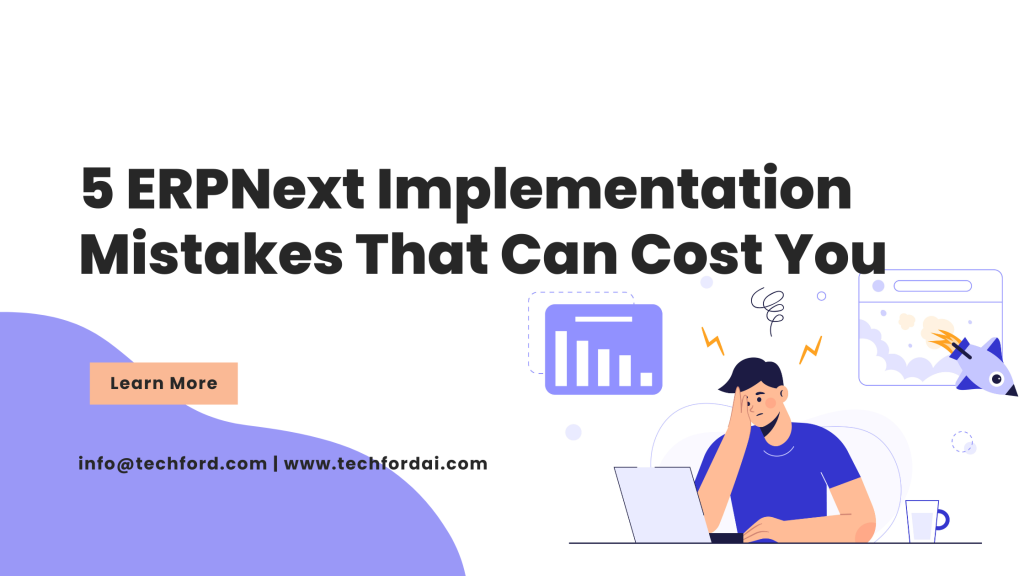
ERPNext, the massively popular open-source Enterprise Resource Planning (ERP) system has gained a solid reputation amongst businesses in the UAE. It provides a wide range of opportunities to control different structures for your business But, if you get it wrong then the whole process of ERPNext implementation can be flipped. It is absolutely vital to know where the most common pitfalls are before diving into business operations and taking action.
Data migrations are always central to any ERP implementation. It is much more difficult and time-consuming to bring the business data across into an ERPNext system from existing systems. Incomplete migration can result in incorrect data, inconsistencies as well as the interference operations.
How to Avoid:
Data Analysis — A detailed analysis to identify the sources, formats and quality of data.
Data Standardization/Cleansing: It consists of cleaning and standardizing data achieved with the purpose to maintain data consistency and validity.
Mapping of Data : Prepare a document drawing the detailed mapping of your existing system’s data fields to ERPNext.
Migrate Pilot: Perform a pilot migration on small scale to identify and fix the issues prior to undergoing full migration.
Training of the users is very important for a smooth implementation of ERPNext. Otherwise, the old system may be too much of a habit and without proper training, employees may face changes loss of productivity, and rising mistakes.
How to Avoid:
Custom Training: Establish training that is tailored to the needs and roles of individual staff members.
Practical exposure: Make a lot of practice sessions with the ERPNEXT system.
Ongoing Support: Provide continued support and resources that will help employees as they start using the new system.
ERPNext is highly customizable, but businesses have to be sure what they specifically want in the configuration aspect before choosing ERP.
Over-customization can result in greater complexity, increased costs, and projected compatibility problems as well.
How to Avoid:
Identify Core Requirements — You must map your business processes and know which module(s) is an absolute requirement from ERPNext.
Customization options: Analyze the customization options and the scale of their impact on the system.
Put Changes in Order: Prioritize all change requests by which ones will provide the most value and benefit.
Enterprises usually have several systems running and they wanted to be able to integrate them with ERPNext. Brand recommendations require third-party integrations which can be quite challenging to implement if not thought out properly.
How to Avoid:
Evaluation Of Integration Needs: Firstly make a note of the systems that are to be integrated with ERPNext and also assess the complexity levels of each.
Select One of several Integration Methods – Choose the best integration method suitable for the data volume, frequency, and security requirements.
As good practice, comprehensive testing and validation of integrations is necessary.
To keep your ERPNext system operational, it is necessary to work on the support and maintenance part. Failure to support following implementation can mean the system encounters problems, data becomes corrupt, and user satisfaction comes down.
How to Avoid:
Develop a Support Plan: Create a support plan that is thorough and includes system updates, maintenance, and troubleshooting code.
Get Vendor Support: Use the vendor support services from your ERPNext vendor or implementation partner.
Training for Internal Staff: Instruct internal staff to offer basic support and troubleshooting.
By following these tips, you would see how they help you improve your business efficiency, productivity, and decision-making.
If you are considering implementing ERPNext in your UAE business, we encourage you to reach out to our team of experts for more information. We are a leading provider of ERPNext services in the UAE and we can help you get the most out of this powerful system.
Lorem ipsum dolor sit amet, consectetur adipiscing elit. Ut elit tellus, luctus nec ullamcorper mattis, pulvinar dapibus leo.
Slider 1 Description Text, Lorem ipsum dolor sit amet, consectetur adipiscing elit. Curabitur laoreet cursus volutpat. Aliquam sit amet ligula et justo tincidunt laoreet non vitae lorem.
Slider 2 Description Text, Lorem ipsum dolor sit amet, consectetur adipiscing elit. Curabitur laoreet cursus volutpat. Aliquam sit amet ligula et justo tincidunt laoreet non vitae lorem.
Slider 3 Description Text, Lorem ipsum dolor sit amet, consectetur adipiscing elit. Curabitur laoreet cursus volutpat. Aliquam sit amet ligula et justo tincidunt laoreet non vitae lorem.
Lorem ipsum dolor sit amet, consectetur adipiscing elit. Suspendisse varius enim in eros elementum tristique.
Lorem ipsum dolor sit amet, consectetur adipiscing elit. Suspendisse varius enim in eros elementum tristique.
Lorem ipsum dolor sit amet, consectetur adipiscing elit. Suspendisse varius enim in eros elementum tristique.
Lorem ipsum dolor sit amet, consectetur adipiscing elit. Suspendisse varius enim in eros elementum tristique.
Lorem ipsum dolor sit amet, consectetur adipiscing elit. Suspendisse varius enim in eros elementum tristique.
Lorem ipsum dolor sit amet, consectetur adipiscing elit. Suspendisse varius enim in eros elementum tristique.